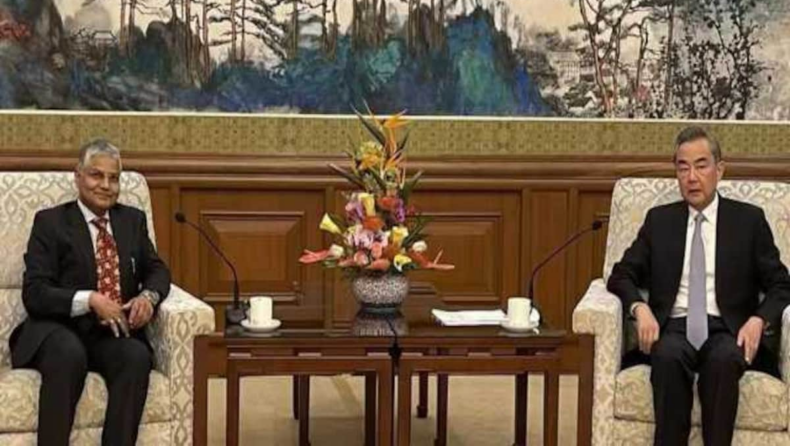Indian envoy Rawat attends his first meeting with Chinese foreign minister Wang Yi ahead of the BRICS summit. They had a discussion on various issues of importance for both the countries.
On Wednesday, Indian Ambassador Pradeep Kumar Rawat met with Chinese Foreign Minister Wang Yi. With the virtual BRICS summit on Thursday, this meeting assumed significance. This year’s virtual BRICS was hosted by President Xi Jinping which Prime Minister Narendra Modi took part in. Rawat emphasised the importance of maintaining peace and tranquillity in the border areas to realise the full potential of the consensus between the top leaders of the two sides on the importance of Sino-India ties for Asia and the world.
Rawat took charge as India’s new envoy to Beijing in March. He made a “courtesy call” on Wang on Wednesday at the Diaoyutai State Guest House. Wang is also a State Councillor, which is a high-level rank in the ruling Communist Party of China (CPC). This was his first meeting with the Chinese Foreign Minister as India’s envoy to Beijing.
Issues discussed
Bilateral and multilateral issues of interest to both sides were discussed during the conversation between Rawat and Wang. Wang Yi conveyed that at the highest level of leadership between the two countries, there is a general agreement on the criticality of bilateral relations for Asia and the world. Wang Yi agreed on the importance of the border issue. He encouraged being committed to a peaceful address through consultation and coordination.
The meeting assumes importance as it took place amidst the chill in bilateral ties over the two-year military impasse in eastern Ladakh. As a result of military-level talks, the two sides concluded the disengagement process last year on the north and south banks of the Pangong lake and in the Gogra area. India consistently maintains that peace and tranquillity along the Line of Actual Control (LAC) is key for the overall development of the bilateral ties.
Wang visited India in March. During this visit, he held talks with Jaishankar and National Security Advisor Ajit Doval. During his conversation with Rawat, Wang recalled his meeting with External Affairs Minister S Jaishankar in New Delhi. Wang disclosed that China has attached importance to India’s concerns regarding the return of Indian students. He hoped to see speedy progress on this. He also referred to the discussions on the resumption of direct flight connectivity between the two countries. Rawat informed that the relevant agencies in India are in consideration of the matter and progress is expected soon.
They agreed that the two sides should make full use of the opportunities provided by multilateral meetings to continue the exchange of opinions, including that between Foreign Ministers of the two countries.
Visa for students and working professionals
Many Indian students who were stranded at home for the past two years due to China’s COVID visa bans were anxious to return to China and re-join their studies. In April, China agreed to permit the return of some such Indian students. They enquired at the Indian Embassy for the details of the students wanting to return.
About 23,000 Indian students are studying at Chinese universities, mostly in medical courses. Over 12,000 Indian students have supposedly expressed their wish to return to China. Their details were collected and have been forwarded to the Chinese government for processing.
Last week, China announced plans to issue visas to Indian professionals and their families working in various Chinese cities. This group of people have been stuck back home for over two years due to Beijing’s COVID visa bans.
India- China bilateral relations
A statement by the Chinese foreign ministry quoted Wang as saying that the common interests of China and India far outweigh their differences. He added that the two sides should support rather than undermine each other, strengthen cooperation rather than guard against each other, and enhance mutual trust rather than be suspicious of each other.
In order to quickly get bilateral ties back on the path of steady and healthy development, he urged both sides to compromise. Both parties should work together to confront numerous global concerns and defend their shared interests as well as those of several developing nations.
The crucial strategic agreement made by the leaders of the two nations should be upheld. They ought to situate the border dispute in the context of their bilateral relations and look for resolutions through discussion and consultation.
According to Wang, China and India should fully exploit their historical advantages in inter-ethnic and inter-cultural exchanges, consistently deepen mutually beneficial collaboration, and collaborate to improve the state of humanity.
China holds this year’s chair of the five-member bloc comprising Brazil, Russia, India, China, and South Africa. On Wednesday, Xi and Modi, along with other heads of the BRICS countries, addressed the BRICS Business Forum. During the meeting, Rawat expressed his appreciation for the opportunity to have an in-person meeting with Wang Yi in spite of COVID-19 related limitations.













